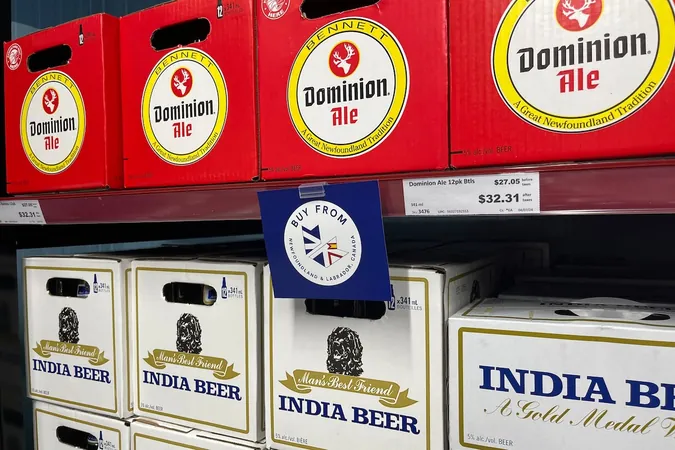
Opening Interprovincial Beer Sales: A Threat to Newfoundland Jobs, Warns Brewery Unions
2025-03-14
Author: Jacob
As Canada makes strides toward eliminating internal trade barriers, unions representing workers at major Newfoundland breweries are raising their voices against proposed changes that could jeopardize local employment. The discussions around easing interprovincial beer sales have grown urgent, especially in the wake of U.S. President Donald Trump’s tariff threats, which have reignited concerns about the survival of local breweries.
According to James Farrell, solicitor and industrial director at FFAW-Unifor, the union representing over 50 workers at the Molson Coors brewery in St. John’s, any relaxation of alcohol trade restrictions would spell disaster for Newfoundland and Labrador’s breweries. "Opening up interprovincial trade of alcohol would have a very detrimental effect on the breweries that are here in Newfoundland and Labrador," Farrell stated. "There’s no upside. You'd flood the market with trucked-in beer."
The potential shift in regulations is particularly unsettling given the established framework that governs alcohol sales in Canada, with each province maintaining its own set of rules. Many provinces, including Newfoundland and Labrador, have local liquor corporations that not only manage alcohol distribution but also impose limits on the amount of beer that can be imported from other provinces for sale, aimed at safeguarding local jobs and industry.
Tom Cooper, a business professor at Memorial University, emphasized that relaxing these regulations could lead to significant consequences for local breweries. “If barriers were removed, Labatt and Molson Coors would likely shutter their St. John’s facilities, opting instead to ship their products from larger breweries in mainland Canada," he explained. “A brewery in Ontario or even Quebec could effortlessly meet the demand of Atlantic Canada without any issue.”
The brewery workers in St. John’s highly value their union positions and feel a strong sense of community with their employers, who are recognized as conscientious corporate citizens actively involved in local sponsorships and community events. Farrell warned that dismantling protective regulations would not only have a substantial economic impact but could also erode the social fabric of the region, as these jobs are integral to local livelihoods.
The repercussions extend beyond Molson Coors; workers at the Labatt brewery in St. John’s—approximately 60 members of their union—are similarly at risk. Alyse Stuart, a spokesperson for the Newfoundland and Labrador Association of Public and Private Employees, stated that "reducing barriers would mean large multinational companies could more easily shift production to larger sites, jeopardizing our local facilities."
In a proactive move, the Newfoundland and Labrador government has assured unions of its commitment to protecting local jobs and breweries. The provincial Finance Department noted the long-standing, beneficial relationship it has maintained with the brewing industry, emphasizing its accountability to workers and local businesses.
At a recent meeting, most provincial premiers signed a pledge with the federal government aimed at facilitating direct-to-consumer alcohol sales. This would permit breweries and producers to sell directly to consumers across provincial lines—potentially transforming the way beer is sold in Canada.
As this discussion evolves, the future of Newfoundland's brewing industry remains in the balance, with both economic and social implications at stake. Whether protective measures will remain in place or be dismantled could very well define the landscape of beer production and sale in the province.









 Brasil (PT)
Brasil (PT)
 Canada (EN)
Canada (EN)
 Chile (ES)
Chile (ES)
 Česko (CS)
Česko (CS)
 대한민국 (KO)
대한민국 (KO)
 España (ES)
España (ES)
 France (FR)
France (FR)
 Hong Kong (EN)
Hong Kong (EN)
 Italia (IT)
Italia (IT)
 日本 (JA)
日本 (JA)
 Magyarország (HU)
Magyarország (HU)
 Norge (NO)
Norge (NO)
 Polska (PL)
Polska (PL)
 Schweiz (DE)
Schweiz (DE)
 Singapore (EN)
Singapore (EN)
 Sverige (SV)
Sverige (SV)
 Suomi (FI)
Suomi (FI)
 Türkiye (TR)
Türkiye (TR)
 الإمارات العربية المتحدة (AR)
الإمارات العربية المتحدة (AR)